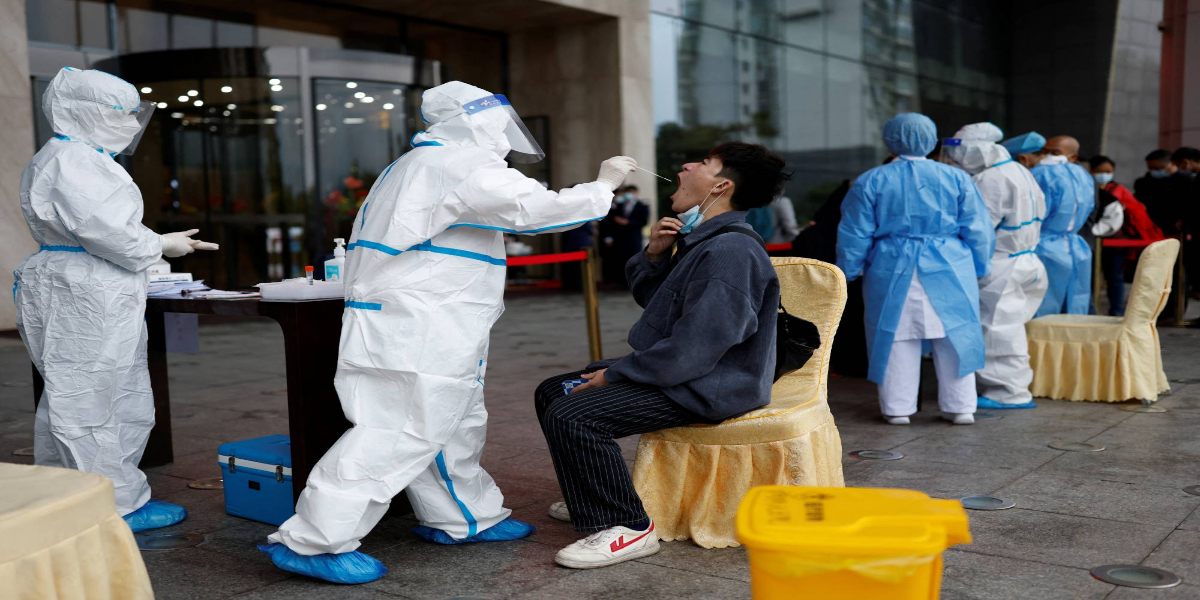Shanghai officials tightened the city-wide COVID lockdown they imposed more than a month ago, extending an ordeal that China’s capital Beijing was keen to avoid by turning mass testing into an almost daily habit into late May.
People familiar with the situation told Reuters that the 25-million-strong business centre was making a renewed drive to reduce case numbers outside of the areas subjected to the harshest restrictions to zero by the second part of May.
Despite the fact that case counts have been declining, transportation restrictions are expected to stay in place for the rest of the month. Authorities in several areas issued letters requiring residents to return to their homes after allowing them to go for short walks or shopping.
Police in hazmat suits debate with people who were informed they needed to be quarantined after a neighbour tested positive in a video extensively circulated on Chinese social media.
One of the cops is overheard saying, “This is so that we can properly eradicate any positive cases.” “Stop asking me why, because there isn’t one. We must follow national regulations.”
The footage could not be independently verified by Reuters.
A request for response from the Shanghai authorities was not immediately returned.
The extended seclusion and dread of being transported to quarantine centres, which sometimes lack bathing and other basic amenities, has resulted in widespread dissatisfaction and even violence.
Last week, videos surfaced online showing scores of Quanta employees overwhelming hazmat-suited security guards and vaulting over plant gates to avoid being stuck inside amid COVID rumours.
COVID limitations in Beijing, Shanghai, and dozens of other major Chinese cities are having a psychological impact on the country’s citizens, pulling down the world’s second-largest economy and affecting global supply chains and international trade.
The regulations contrast sharply with the rest of the globe, which is reducing or eliminating COVID restrictions to let people to live with the virus even as infections spread.
Many people have voluntarily closed gyms and entertainment venues, barred dine-in services at eateries, and blocked scores of bus routes and nearly 15% of Beijing’s huge metro system.
“It’s extremely unusual,” remarked Ding, a 50-year-old Beijing resident, as he snapped a photo of a deserted street heading to a shuttered subway station. “This is the first time I’ve seen deserted streets in the middle of summer in all my years in Beijing.” It’s enchanted.”
Persons did not want to do anything that would put them near infected people and force them into quarantine, therefore businesses that remained open did not see many customers.
“There are malls and offices north of us that have been sealed, and if they come, their apps might record them as close contacts,” said a barber called Song, referring to the mobile tracking software that all residents must use.
“Everyone has been shaken by this pandemic.”
Premier Li Keqiang committed on Saturday, in a teleconference with other top officials, to support “as many employers as feasible,” particularly small and medium businesses, in order to keep people employed, according to state media.
In March, China’s unemployment rate hit 5.8%, the highest since May 2020, with a record 6.0 percent in 31 large cities. The job market has been further hammered since April’s full lockdown of Shanghai and further restrictions elsewhere.
Regardless of the sacrifices, Chinese authorities are steadfast in their determination to eradicate the coronavirus. The authorities threatened critics of the zero-COVID policy with legal punishment last week.
[embedpost slug=”/no-choice-shanghai-residents-sent-out-of-city-during-covid-crackdown/”]
Many communities are planning to make regular testing a part of everyday life in the hopes of better detecting and isolating illnesses.
Residents in Beijing’s Chaoyang, Fangshan, and Fengtai districts, as well as tiny areas of other districts, lined up for another round of tests on Sunday. Two persons strolled through a vast Chaoyang property with loud speakers blasting a constant message telling inhabitants to get examined.
Many residents must produce a recent negative result to get to work or visit other locations, even if they were not subject to the mass tests.
Shanghai will continue to conduct daily screening after doing 63 million PCR tests and 126 million fast antigen testing last week, according to city officials.
Thousands of permanent PCR testing sites are being built in Shanghai and other locations.
Daily COVID cases in Beijing are in the dozens, far lower than in Shanghai at this stage of the outbreak, when infections were in the triple digits and climbing.
Shanghai’s cases declined for a ninth day on Sunday, but remained in the thousands, prompting party and local officials to warn against complacency.




















